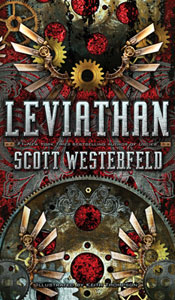|
Leviathan (Westerfeld novel)
Leviathan is a 2009 novel written by Scott Westerfeld and illustrated by Keith Thompson. It is the first work in the trilogy of the same name, followed by sequels Behemoth and Goliath.[1] The trilogy is set in an alternative version of World War I in which the Central Powers (known in-universe as "Clankers") use mechanized war machines and the Triple Entente (referred in text as "Darwinists") fabricate living creatures genetically for use in battle. Leviathan was named the Best Young Adult Novel by the Aurealis Award in 2009,[2] Locus in 2010, and Mir Fantastiki in 2011. PlotThe novel opens at the beginning of an alternative version of World War I; in which the Austro-Hungarians and Germans have their Clankers, diesel-driven mecha loaded with guns and ammunition, and the British Darwinists employ genetically-engineered animals as their weaponry. The titular Leviathan is a whale airship, the most masterful beast in the British fleet. The novel follows two characters, Aleksandar of Hohenberg, a prince of the Austro-Hungarian Empire and Deryn Sharp, a commoner girl. Aleksandar, is depicted as on the run after his people turn against him. Deryn, poses as a boy ("Dylan Sharp") and goes aloft with a Huxley (a fictional jellyfish-like creature that uses hydrogen to float) to prove her airworthiness. A storm hits and blows Deryn over the North Sea, where she and the Huxley are rescued by the Leviathan. She is inducted into the crew of the Leviathan and makes friends with the 'Monkey Luddite' Newkirk. The Leviathan's mission is to transport a top British boffin, or scientist, and a secret package to Constantinople. In the next plot twist, Deryn learns the boffin is a woman, Dr. Nora Barlow, and fears Barlow will discover her secret. The book follows the Leviathan's flight across Europe, describing it coming under attack from German airplanes. The crew fights back and defeats the planes, but crash-land in Switzerland on a glacier where Aleksandar and Volger witness the crash from their refuge. Volger insists they do nothing to interfere, as they will risk giving away their position to the Germans or being captured by the British. Alek secretly leaves the fortress to bring medicine to the crew of the fallen ship. Alek finds an unconscious Deryn and revives her, unconvincingly to be a Swiss villager. Deryn is suspicious of him and sounds the alarm, resulting in Alek's capture. The secret cargo brought by Dr. Barlow is revealed to be eggs of some kind, though most were destroyed in the crash. Alek's "family" comes to his rescue, and battle almost erupts between the two sides, but Deryn's quick thinking brings everyone together to talk under a flag of truce. Realizing their differences are outweighed by their similarities, Alek offers a sizable chunk from their food storage so the ship can replenish its hydrogen supply and take off again. As they travel back to the Leviathan, two German zeppelins appear and send out commandos to capture them, severely damaging the Stormwalker and making it impossible to repair. The two groups decide to combine their technologies and leave together as one group. Alek also admits his true origins to Deryn/Dylan and Dr. Barlow when he realizes he let a few too many things slip. The Austrians dismantle the Stormwalker and use its engines to replace those lost by the Leviathan. The Austrian engines prove to be much more powerful than their previous ones, propelling them quickly away from danger and Herkules, a deadly Clanker ship. In the aftermath, Dr. Barlow reveals information about a fabricated ship in England that was sold to the Ottoman Empire but then taken back by Winston Churchill despite being paid in full, thus creating tension between the British and the Ottomans. The novel closes with the Leviathan continuing its flight towards Constantinople with Alek watching the mysterious eggs that will hatch into some unknown fabricated species. DevelopmentThe idea of incorporating illustrations into the Leviathan Trilogy began back in 2007 when author Westerfeld discovered illustrations for the Japanese translation of his earlier work Uglies, which he had shared on his blog.[3][4] He was met with feedback from English-speaking fans who complained of how their novels were lacking in such features; until one reader pointed out how they are a norm in Japanese novels, particularly light novels. Further research by Westerfeld also found it to be a commonality in old Western novels before the invention of the camera. Inspiration also came from adventure novels that were around during the World War I era, which became one basis of research for the series' settings.[4][5] Anime series adaptationIn June 2024, Netflix announced an anime series based on the novels.[6] Produced by Qubic Pictures with animation production by Orange, the series is scheduled for a 2025 release.[6] ReceptionLeviathan received a starred review from Kirkus Reviews and was compared to works by Hayao Miyazaki, Kenneth Oppel and Naomi Novik. Even such, Kirkus Reviews stated that the novel could "stand—or fly—on its own."[7] It also gained a starred review from School Library Journal, who said it was "full of nonstop action" and that "this steampunk adventure is sure to become a classic."[8] The ALSC selected it as a 2010 Notable Children's Book[9] and the YALSA listed it on their 2010 Best Books for Young Adults.[10] In addition, Leviathan won the 2009 Aurealis Award for Best Young Adult Novel.[11] References
External links
|
||||||||||||||||||||||||||||||||||||
